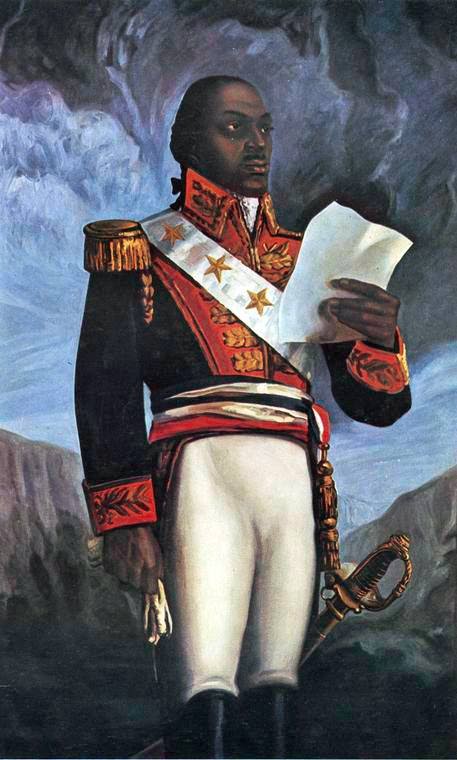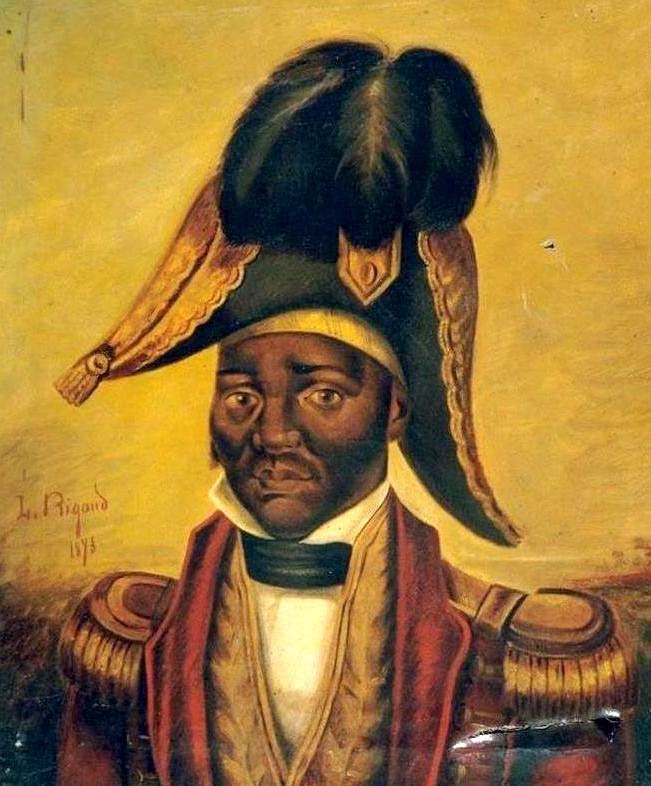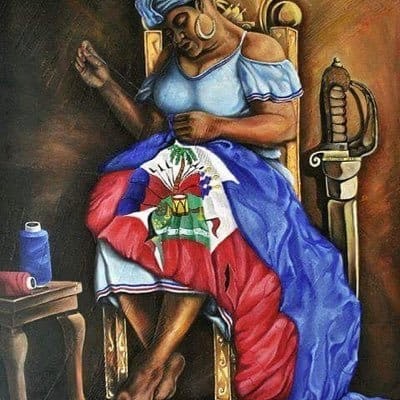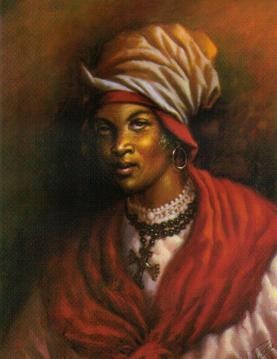Written by:
Patricia Fortunato, Content and Program Manager, Research and Grants, NeuroMusculoskeletal Institute (NMI), Rowan University School of Osteopathic Medicine (RowanSOM), Southern New Jersey Medication for Addiction Treatment Center of Excellence (MATCOE); and
Gabby McAllaster, Ph.D. Candidate in Education at Rowan University and Doctoral Graduate Coordinator for Rowan University's Division of Diversity, Equity, and Inclusion (DEI)
On January 1, 1804, Haiti proclaimed freedom and independence, and made history by being the first Black republic in the world and the first country in the Western Hemisphere to abolish slavery. The Haitian Revolution began in 1791 when enslaved peoples and some free People of Color began a rebellion against French authority in what was then known as Saint-Domingue. Haiti beat three world powers (France, Britain, and Spain) and took their freedom by force. The first two days of the calendar year are dedicated to commemorate Independence Day and celebrate Ancestors' Day, remembering the Founders of Haiti and the individuals who sacrificed their lives during the fight for Independence.
Terms:
Haiti: Haiti is a country in the Caribbean Sea. The country includes the western geographical third of Hispaniola (Hispaniola is also known as Greater Antilles). The country also includes smaller islands, such as Tortue (Tortuga), Grand Caye, and Gonâve. The capital is Port-au-Prince.
Haitian: Haitians are citizens of Haiti and descendants in the diaspora. They are an ethno-national group, generally composed of modern descendants of self-liberated Africans in Saint-Domingue.
Haitian Creole: Haitian Creole is a French-based creole language, and the native language of most of Haiti.
History:
Haiti's original name was "Ayiti, Quisqueya, Bohio." It was a name given by the original inhabitants.
Toussaint L'Ouverture (born c. 1743 and died April 17, 1803) was the leader of the Haitian Revolution from 1787–1789 (French Revolution). L'Ouverture famously emancipated enslaved peoples. He also negotiated for Haiti to be governed by former enslaved peoples as a French protectorate.

Jean–Jacques Dessalines (born September 20, 1758 and died October 17, 1806) was also a leader of the Haitian, and the first ruler of Haiti after it declared independence from France, becoming the first country to permanently abolish slavery. Dessalines is regarded as one of the founders of Haiti.

Catherine Flon (born in the 18th century; birth and death dates unknown) is known as a heroine of the Haitian Revolution. Flon sewed the first Haitian flag on May 18, 1803 with guidance from Jean–Jacques Dessalines, her godfather.
Flon's legacy is a symbol for feminist groups in present-day Haiti. In 2016, the National Alliance for the Advancement of Haitian Professionals (NAAHP) and the Danielle Saint Lot Haiti Women's Foundation held a symposium at the UN, titled "The Catherine Flon Symposium: Cultivating Innovation, Entrepreneurship, and Economic Empowerment" to support the role of women entrepreneurs in Haiti's economic development. (link to view video)

Cécile Fatiman (born 1771 and died 1883) was a Haitian vodou priest and mambo. Fatiman led a vodou ceremony that is recognized to have helped ignite the Haitian Revolution. Her mother was an African woman, and her father was a white French Corsican prince.

How is Haitian Independence Day Celebrated?
The day is marked with fireworks, dancing, and renditions of the national anthem. A New Year's Day tradition in Haiti is soup joumou, pumpkin soup. The story is that enslaved peoples in Haiti were forbidden from drinking soup joumou as it was a delicacy reserved for colonialists. Today, drinking the soup on January 1st is a tradition to mark the country's liberation and has become a symbol of freedom.
Reasons Haiti's Independence Day is Important:
Haiti defined freedom to lawfully include people of color: While the United States and France actively excluded People of Color in The American Declaration of Independence (1776) and the French Declaration of the Rights of Man and Citizen (1789), Haiti actively challenged the notions of equality, liberty, and freedom:
"We have dared to be free, let us be thus by ourselves and for ourselves. Let us imitate the grown child: his own weight breaks the boundary that has become an obstacle to him. What people fought for us? What people wanted to gather the fruits of our labor? And what dishonorable absurdity to conquer in order to be enslaved. Enslaved?... Let us leave this description for the French; they have conquered but are no longer free. Let us walk down another path; let us imitate those people who, extending their concern into the future, and dreading to leave an example of cowardice for posterity, preferred to be exterminated rather than lose their place as one of the world's free peoples.
Let us ensure, however, that a missionary spirit does not destroy our work; let us allow our neighbors to breathe in peace; may they live quietly under the laws that they have made for themselves, and let us not, as revolutionary firebrands, declare ourselves the lawgivers of the Caribbean, nor let our glory consist in troubling the peace of the neighboring islands. Unlike that which we inhabit, theirs has not been drenched in the innocent blood of its inhabitants; they have no vengeance to claim from the authority that protects them."
Dubois, L., & Garrigus, J. D. (1789). The Haitian Declaration of Independence. Slave Revolution in the Caribbean, 1789–1804: A Brief History with Documents, 188–191.
The Haitian Revolution was the beginning of the end of the transatlantic slave trade: Three years after Haiti declared Independence, in 1807, Britain abolished the transatlantic slave trade. Haiti's successful revolt and declaration of Independence from France was a powerful force in national policy change. Soon thereafter, the U.S. followed suit and passed legislation banning the slave trade.
The United Nations commemorated Haiti's essential role in ending the slave trade by adopting August 23rd as the official International Day for the Remembrance of the Slave Trade and Its Abolition, this was the date that the Haitian Revolution began.
Fischer, H., & Jansari, S. (2020). International Day for the Remembrance of the Slave Trade and its Abolition.
Haiti is the reason for the Louisiana Purchase: The Louisiana Purchase of 1803 was driven by the Haitian Revolution, during which the U.S. bought 828,000 square miles of territory from France for three cents an acre. During the Haitian revolution, Napoleon poured many of France's resources into the war because France exploited many rich resources from Haiti including 60% of all of the coffee and 40% of all of the sugar consumed in Europe. However, Haitian peoples were quickly overthrowing France, causing France to go broke, and forcing Napoleon to settle in the Louisiana Purchase of 1803.
Haiti represents perseverance and strength: After gaining freedom, Haiti was forced to pay France 90 million francs ($21 billion UDS) to be recognized as a legitimate country and was also forced to pay plantation owners who lost enslaved peoples during the revolution. Haiti didn't finish paying off these debts until 1947. Furthermore, the United States refused to recognize Haiti's independence and therefore would not trade with Haiti, up until 1862 (60 years after Haitis independence). These diplomatic and trade relations with other nation significantly impacted Haitis growth. Above it all, Haiti has stood as perseverant and stands as a strong symbol of freedom and liberty.
Resources for Continued Learning:
Books:L'Ouverture, T. (2019). The Haitian Revolution. Verso Books.
Dayan, J. (1996). Haiti, History, and the Gods. Univ of California Press.
Maingot, T. (1997). Alex Dupuy, Haiti in the New World Order: The Limits of the Democratic Revolution (Boulder, CO, and Oxford: Westview Press, 1997), pp. xiii+ 220,£ 43.95,£ 11.95 pb. Journal of Latin American Studies, 29(3), 769-812.
Articles and Websites:
Maclean, F. (2008). The Lost Fort of Columbus (Christopher Columbus). Smithsonian, 38(10), 72-76.
Teaching about Haiti (via Teaching for Change: Building Social Justice Starting in the Classroom): teachingforchange.org/teaching-about-haiti-3
Social Justice Books About Haiti, for Children and Young Adults (via Teaching for Change: Building Social Justice Starting in the Classroom): socialjusticebooks.org/booklists/haiti
Five Ways to Teach about Haiti (via New York Times): learning.blogs.nytimes.com/2010/01/14/5-ways-to-teach-about-haiti-right-now
Five Reasons Why You Should Care about Haiti's Independence Day (via P4H Global): p4hglobal.org/p4h-blog/2019/12/31/5-reasons-why-you-should-care-about-haitis-independence-day-january-1st
News about Haiti (via Democracy Now!): democracynow.org/topics/haiti